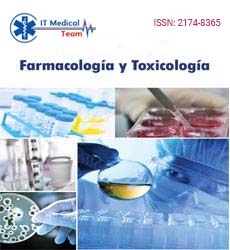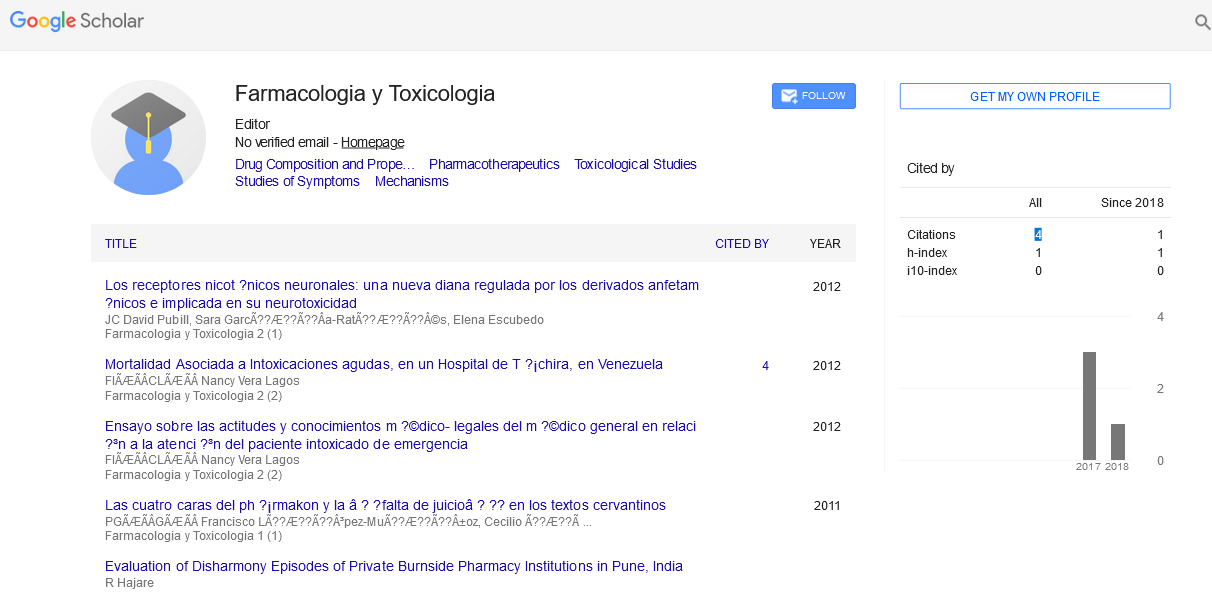Perspective - (2024) Volume 14, Issue 1
Realm of Medical and Clinical Toxicology: Understanding, Diagnosing and Treating Poisonings
Magdalena Wiercioch*
Department of Toxicology, University of Zeszeew, Rzeszow, Poland
*Correspondence:
Magdalena Wiercioch, Department of Toxicology, University of Zeszeew, Rzeszow,
Poland,
Email:
Received: 10-Jan-2024, Manuscript No. IPFT-24-14474;
Editor assigned: 15-Jan-2024, Pre QC No. IPFT-24-14474 (PQ);
Reviewed: 29-Jan-2024, QC No. IPFT-24-14474;
Revised: 07-Feb-2024, Manuscript No. IPFT-24-14474 (R);
Published:
15-Feb-2024
Introduction
Medical and clinical toxicology is a dynamic and crucial field
that deals with the study, diagnosis and treatment of poisonings.
Poisonings can result from exposure to various substances,
including chemicals, drugs and toxins, leading to a wide range of
adverse effects on the human body. This article aims to delve
into the multifaceted world of medical and clinical toxicology,
shedding light on its significance, diagnostic approaches and
evolving treatment strategies.
Description
Defining medical and clinical toxicology
Medical toxicology focuses on the management of poisoned
and envenomated patients. It involves the identification,
diagnosis and treatment of poisoning cases, as well as the
prevention of further exposure. Clinical toxicology, on the other
hand, encompasses the broader study of the toxic effects of
substances on humans and animals, including the mechanisms
of toxicity, risk assessment and the development of antidotes.
Significance of medical and clinical toxicology
The importance of medical and clinical toxicology cannot be
overstated, as poisonings pose a significant public health
challenge globally. Accidental poisonings, intentional overdoses
and exposures to environmental toxins are common occurrences
that necessitate the expertise of medical toxicologists. The field
plays a pivotal role in preventing morbidity and mortality
associated with poisonings, ensuring prompt and accurate
diagnosis and treatment.
Diagnostic approaches in medical and clinical
toxicology
The diagnosis of poisoning cases requires a systematic
approach, considering the diverse range of toxic substances and
the variability in individual responses. Clinical history, physical
examination and laboratory investigations form the cornerstone
of the diagnostic process.
Clinical history: Gathering a comprehensive clinical history is
crucial in identifying the potential toxic agent. Information about
the patient's occupation, hobbies, recent travel and medication
history can provide valuable clues. Additionally, details regarding
the time of exposure, route of exposure and the amount
ingested are essential for a precise diagnosis.
Physical examination: A thorough physical examination aids
in identifying signs and symptoms associated with poisoning.
Toxic exposures can manifest with a spectrum of clinical
presentations, ranging from mild symptoms to life-threatening
conditions. Skin rashes, respiratory distress, altered mental
status and gastrointestinal symptoms are common indicators of
poisoning.
Laboratory investigations: Various laboratory tests help
confirm the presence of toxic substances and assess the severity
of poisoning. Blood and urine samples are commonly analyzed for
toxicological screening. Techniques such as Gas Chromatography-
Mass Spectrometry (GC-MS) and immunoassays enable the
detection of drugs, chemicals and toxins in biological samples.
Additionally, measuring specific biomarkers and blood levels of
drugs or toxins aids in assessing the extent of exposure.
Treatment modalities in medical and clinical
toxicology
The treatment of poisoning cases is tailored to the specific
toxic agent involved and the severity of symptoms. Prompt and
appropriate interventions are crucial in preventing complications
and improving outcomes. Treatment modalities in medical and
clinical toxicology include:
Decontamination: Decontamination involves removing or
neutralizing the toxic substance from the patient's body. Methods
such as gastric lavage, activated charcoal administration and skin
decontamination are employed based on the type of exposure.
Gastric lavage helps remove ingested toxins from the stomach,
while activated charcoal adsorbs the toxic substance, preventing
its absorption in the gastrointestinal tract.
Antidotes: Antidotes are specific agents that counteract the
effects of particular toxins. Medical toxicologists use antidotes
based on the identified toxic substance. For example, naloxone is administered to reverse opioid toxicity, while atropine is used
for organophosphate poisoning. The availability and
administration of antidotes are critical in managing poisoning
emergencies.
Supportive care: Supportive care addresses the symptoms
and complications associated with poisoning. This may include
respiratory support, fluid and electrolyte management and
interventions to control seizures. The goal is to stabilize the
patient's condition while the body naturally eliminates the toxic
substance.
Enhanced elimination techniques: In some cases, enhancing
the elimination of the toxic substance from the body may be
necessary. Techniques such as hemodialysis and hemoperfusion
can be employed to remove toxins that are not effectively
eliminated by the body's normal processes.
Technological advancements in medical and clinical
toxicology
The landscape of medical and clinical toxicology has evolved
with technological advancements, enhancing diagnostic
capabilities and treatment strategies.
Toxicogenomics: Toxicogenomics explores the relationship
between an individual's genetic makeup and their susceptibility
to toxic substances. Understanding genetic variations can help
predict individual responses to specific toxins, allowing for
personalized approaches to diagnosis and treatment.
Point-of-care testing: Rapid and portable diagnostic tools have
become integral in toxicology. Point-of-care testing allows for
quick on-site detection of toxic substances, enabling healthcare
providers to make timely decisions in emergency situations.
Teletoxicology: Teletoxicology involves the remote consultation
of medical toxicologists using telecommunication technologies.
This approach facilitates real-time guidance for healthcare
providers in managing poisoning cases, especially in settings
where immediate access to specialized toxicology expertise may
be limited.
Challenges and future directions
Despite significant progress in medical and clinical toxicology,
challenges persist. The increasing complexity of novel synthetic
drugs, environmental pollutants and emerging toxins poses
ongoing challenges for diagnosis and treatment. Additionally,
the globalization of commerce and travel necessitates a
collaborative international approach to address the diverse
array of toxic exposures.
The future of medical and clinical toxicology lies in continued
research, education and technological innovation. Advancements
in analytical techniques, data analytics and artificial intelligence
can further enhance our understanding of toxicology and improve
patient outcomes. Collaborative efforts between healthcare
professionals, toxicologists and regulatory bodies are essential to
staying ahead of emerging threats and ensuring effective
management of poisoning cases.
Conclusion
Medical and clinical toxicology play a vital role in safeguarding
public health by addressing the myriad challenges posed by
toxic exposures. The field's interdisciplinary nature, combining
elements of medicine, pharmacology and toxicology, makes it a
dynamic and evolving discipline. As our understanding of
toxicology deepens and technology continues to advance,
medical and clinical toxicologists are better equipped to
diagnose, treat and prevent the adverse effects of poisonings,
ultimately saving lives and improving the overall well-being of
individuals and communities.
Citation: Wiercioch M (2024) Realm of Medical and Clinical Toxicology: Understanding, Diagnosing and Treating Poisonings. Farmacologia
Toxicologia Vol.14 No.1





